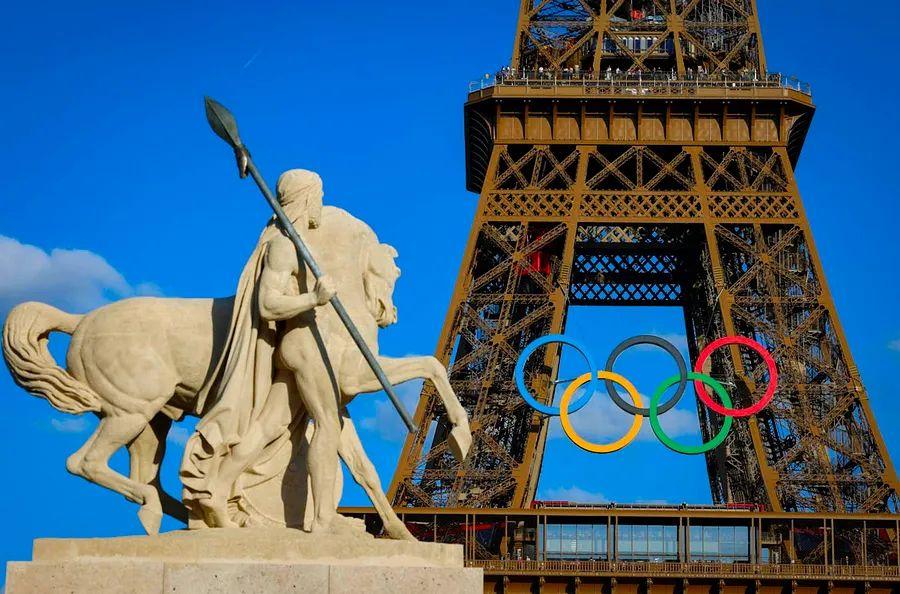Getting around Paris during the Olympics: tips to dodge transport fare hikes and more

With around 15 million visitors anticipated to flock to the French capital for the Olympic and Paralympic games, Paris’s public transit and security services will face tremendous strain.
As the games approach, starting with the opening ceremony on July 26 and concluding on September 8, numerous announcements regarding metro fares, as well as road and metro closures, alongside heightened security measures, have left even locals feeling confused.
It's understandable for visitors to feel a bit overwhelmed by the influx of information. To help simplify things, here’s a guide on how to navigate Paris effectively during the Olympics—and beyond—while considering how new security regulations may affect your travel plans:
What documents should I prepare for my trip to the Paris 2024 Olympics?
Passport holders from the US, Canada, the UK, and EU countries can enter France without a visa for stays up to 90 days. If you're from elsewhere, the government provides a helpful tool called the “visa wizard” to determine whether you need a visa and what travel documents you'll need to carry.
Where will the Paris 2024 Olympics be held?
The games in Paris will take place across 15 Olympic and 11 Paralympic venues, extending into nearby suburbs like Les Yvelines, Hauts-de-Seine, Seine-et-Marne, and Seine-St-Denis.
Events including soccer, handball, basketball, and sailing will also occur in cities such as Bordeaux, Nantes, Lyon, St-Etienne, Nice, and Marseille.
The surfing competition is set to take place in the overseas territory of Tahiti.
 Metro ticket prices are set to increase significantly, but you can avoid the fare hike with some preparation © Shutterstock
Metro ticket prices are set to increase significantly, but you can avoid the fare hike with some preparation © ShutterstockWill metro tickets actually cost twice as much during the Olympics?
Yes, it's true. The price of a single metro ticket in Paris will double for visitors who don’t plan ahead. From July 20 to September 8, the fare will rise from €2.15 to €4.
However, you can completely avoid this increase with a bit of foresight.
By downloading the regional transport authority’s app on your smartphone before July 20, visitors can purchase single tickets in advance at the regular price of €2.15 each. Buying a pack of 10 tickets for €17.35 offers even greater savings, reducing the cost to €1.73 per trip. Users can keep up to 30 tickets on their app and add more as needed, avoiding long waits at ticket kiosks. Simply scan your phone at the metro turnstile to enter seamlessly.
For those who prefer a physical metro card, consider getting a Navigo Easy pass available at metro stations or approved retailers like tobacco shops and newsstands for €2. These rechargeable cards allow you to purchase tickets via the app and transfer them directly to the card by holding it against your phone. For those less comfortable with technology, cards can also be reloaded at metro stations.
Introducing the Olympic daily pass
Visitors can also buy the specially designed Paris 2024 Pass, starting at €16 for one day, which provides unlimited access to all competition venues in Île-de-France and to Orly and Roissy Charles-de-Gaulle airports. The pricing is tiered, making longer durations cheaper—such as a 7-day Paris 2024 Pass costing €70, equating to €10 per day. This pass can be acquired through the app or at train stations and ticket machines, valid from July 20 to September 8.
After September 8, normal fares will resume. Future visitors should consider downloading the transportation app to skip lines at metro stations and save some euros.
New connection to Orly airport
For those flying to and from Paris-Orly airport, a new extension of metro line 14 has been launched, linking the airport directly to the city center. Passengers arriving at Orly can now easily access popular transfer stations like Châtelet and Saint-Lazare, extending to the northern suburb of Saint-Ouen. Keep in mind that fares to the airport are separate from standard metro prices and will cost an additional €10.30 per trip.
 Not all Metro stations will be operational during the Games © Chesnot/Getty Images
Not all Metro stations will be operational during the Games © Chesnot/Getty ImagesImportant station closures to note:
As you plan your metro journey, remember that the following stations will be closed for most of the summer until September 21:
Concorde, Tuileries, Champs-Elysées – Clemenceau
You can find a complete list of closures and reduced metro services from July 18-25 here. For the most accurate metro itineraries and real-time updates on closures and disruptions, Google Maps is a dependable option, along with the Paris metro apps Bonjour RATP and the regional transport authority's Île-de-France Mobilités.
The Bonjour RATP app also allows users to rent from a fleet of 35,000 bikes available through Dott, Lime Tier, and Vélib.
Will I need a QR code to navigate Paris during the games?
The answer varies based on several factors, such as your transportation method, travel dates, and your destination's location. However, deciphering the rules involves navigating through a complex web of conditions and exceptions.
The Pass Jeux, or Games Pass, is a digital pass or QR code that grants access to sensitive security areas, especially as we approach the opening ceremony. For the first time in Olympic history, this ceremony will take place outdoors along the Seine River instead of in a stadium, presenting significant security challenges.
 Triathlon competitors dive into the Seine River beside the Alexandre III bridge during a Test Event for the women's triathlon © Miguel Medina/AFP/Getty Images.
Triathlon competitors dive into the Seine River beside the Alexandre III bridge during a Test Event for the women's triathlon © Miguel Medina/AFP/Getty Images.In the days leading up to the opening ceremony,
From July 18-26, if your hotel or restaurant is located in the high-security grey zone along the Seine, and you're traveling on foot or by bike, you'll need to obtain a QR code to gain access. Cars, including taxis and ride-sharing services, are not allowed in this area.
However, this requirement does not apply to those holding tickets for attractions in the zone. Individuals with confirmed reservations are exempt from needing a QR code and can simply show their ticket at security checks. This includes the Louvre and Orsay museums (both closed July 25-26), the Eiffel Tower (closed July 26), and the Institut du Monde Arabe.
Be aware that all river cruise excursions will be halted from July 20-26.
Outside the grey zone and within the larger red perimeter, pedestrians, cyclists, and scooter users can move about freely without a QR code. If you're traveling by taxi or ride-share, you don't need a QR code, but you must show proof of a hotel, museum, or restaurant reservation to enter the area.
Following the opening ceremony,
From July 27 to August 11, and again during the Paralympics from August 28 to September 8, areas surrounding competition venues will be designated as red zones starting 2.5 hours before an event and lasting for an hour afterward. Pedestrians and cyclists won't need a QR code, but those using taxis or ride-sharing services in these areas must show a Games Pass.
In addition to your digital pass, be sure to carry your photo ID and proof of accommodation or reservations to present to law enforcement.
Those holding tickets for Olympic events do not need a QR code to enter the venues.
If you're uncertain, you can consult the interactive map to determine whether your destination is within a security zone.
Digital passes are free and are not necessary for children under 13.
QR codes can be requested through the Pass Jeux platform, requiring applicants to provide a photo ID and proof of reservations.
The key point: to avoid traffic woes, the most effective way to reach your destination—whether it's a competition site or a restaurant—is by using public transport, walking, or biking. These options also support the sustainability initiatives of the Paris Olympics.
 France's excellent rail network will seamlessly connect you between events and cities © EQRoy / Shutterstock
France's excellent rail network will seamlessly connect you between events and cities © EQRoy / ShutterstockPlanning to explore other French cities during the Olympic games? Here's how to navigate the country's rail system.
Remember that France's ban on domestic short-haul flights lasting under 2.5 hours for trips easily completed by train was implemented in 2022. Therefore, if you're attending Olympic events in cities like Nantes, Bordeaux, or Lyon, your only travel option (unless you opt to drive) is by train. Fortunately, this method is also the most convenient and least stressful.
However, the various rail operators in France can be a bit perplexing. Here’s a brief overview of the different rail lines and operators:
The SNCF is the national railway service, running the country's high-speed TGV trains. For instance, a high-speed journey from Paris to Lyon takes about two hours. This will be your first stop when searching for train tickets to other host cities.
Inoui refers to premium seating and service options.
Ouigo offers a low-cost alternative to the SNCF, though ticket availability and schedules are more limited.
Trains operated by Intercité connect cities without high-speed routes, linking major cities directly without requiring a transfer in Paris. Routes include Nantes–Bordeaux and Toulouse–Marseille, and they also run night services connecting Paris to places like Nice, Lourdes, and Toulouse.
TER (Transport Express Régional) trains connect cities and smaller towns throughout the country's 12 metropolitan regions.
Transilien serves a similar function as the TER but specifically for the Île-de-France region.
The RER (Réseau Express Régional) functions as a commuter line within Paris and its suburbs.
 List of major transport hubs
List of major transport hubsPlanning a trip for the Olympics might initially feel overwhelming, but by familiarizing yourself with your options and understanding how the various systems for ticketing, accommodations, and transportation operate, you can gain clarity and look forward to being part of this historic event.

1

2

3

4

5
Evaluation :
5/5